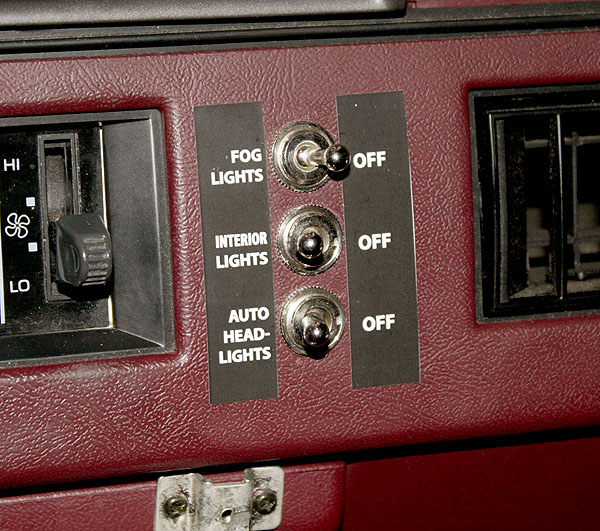 |
|
 |
2010
March
29-31
|
How I use a typewriter

You'll recall that one of my new year's resolutions for 2010 was to resume
using typewriters, after 25 years of trying, not quite successfully, to use
computers as total replacements. So what do I use a typewriter for?
Obviously, forms and envelopes. It takes less time to type an address on an
envelope than to figure out how to get the computer to print on an envelope,
then actually feed the envelope through the printer.
But I also type my "to-do list" on a typewriter every day.
This works out surprisingly well.
By typing it all by hand, I ensure that everything on it actually passes
through my conscious mind. Also, I have an incentive: I have to type things
over and over, once a day, until I get them done!
And the typewriter never interrupts me with e-mail, nor does it want to
update its software.
(What you see in the picture is my second Selectric II, purchased this year.
I use it at home and use the 1975 blue one at the office. The beige one has
all the features I wanted, but thought I couldn't afford, back in '75:
dual pitch, correcting, and 1.5-line spacing.)
Barring unforeseen developments,
I'm going to close out the month early,
wish everyone a blessed Holy Week,
and see you all in April!
Permanent link to this entry


|
2010
March
28
|
Campus buses done right
At Emory University, you can track the location of all of the shuttle buses
on line.
(Yes, and zoom in and actually see them moving.)
If the University of Georgia had this, we might know the solution to some
mysteries. It's like researching the behavior of migratory birds:
Where do they go? How long do they stay there? How do they decide
when to come back?
Permanent link to this entry


|
2010
March
27
|
Stop the gloom, fortunes are being made
Has anybody noticed that the stock market and other investments have
been rising steadily for a year or more?
Here is the past year of
FRESX,
a real-estate mutual fund:

The most important part of "buy low, sell high" is "buy low," and anybody who
bought investments a year ago — or held on to what they already had — is much
better off today. Unfortunately, the same people who thought the stock market was a bank,
five years ago, are now thinking it is worthless.
Permanent link to this entry


|
2010
March
26
|
"Resistance is futile"

Credit Melody for expressing this Star Trek catchphrase as a circuit diagram.
Permanent link to this entry
Greek calligraphy
A prominent London calligrapher
(click also here)
wrote to me today to thank me for devising a way to do
italic handwriting in Greek.
He has done much more with it than I have!
Permanent link to this entry


|
2010
March
25
|
Today's great technical discovery
Today's great technical discovery:
If you get hold of a ribbon cartridge for an IBM Selectric Composer
(green color-coded) and put it on a Selectric II typewriter,
it works beautifully, and doesn't "lift-off" (is not correctable),
which means it can be used safely to type checks.
Who else but me would have tried this in 2010?
Admittedly, quite a few people probably tried it in the 1970s.
Permanent link to this entry


|
2010
March
24
|
Yum!
There is
kosher-for-Passover Coca-Cola
at Publix in Watkinsville.
Permanent link to this entry


|
2010
March
23
|
Not an evil conspiracy
The new health care legislation may be misguided and expensive,
but it is not an evil conspiracy and I am getting tired
of right-wing grandstanders misrepresenting it.
For accurate information about the bill,
click here.
For a thoughtful critique of it by a world-class economist,
click here.
Note especially that he points out a trade-off between maximum freedom for individuals
and what's good for the community.
(Maximum freedom for individuals is not the summum bonum. If it were, we wouldn't have an army,
at least not a taxpayer-supported one; you'd be "free" to defend yourself, or not, when an enemy invades.)
For my own position on health insurance (written a while before the bill passed),
click here and here.
Finally, I don't understand why conservatives are so upset about the government requiring
people to buy health insurance. That's the part conservatives ought to like because
it minimizes the role of government. If we regulate insurance, and require you to buy it,
but buy it from industry, not from the government, then in my opinion we're doing
a lot better than if we were to tax you and "give" you benefits. Nobody objects to being
required to buy car insurance. Health insurance is similar.
And an afterthought: Yes, there are going to be hidden costs, but there will also be
hidden economic benefits from keeping people healthier, reducing the load on emergency
rooms, and allowing people to change jobs more easily.
Permanent link to this entry


|
2010
March
22
(Extra)
|
Congratulations, Cathy!
 Cathy has accepted an offer of admission, including a scholarship, from the
University of Kentucky College of Law and will be moving to
Lexington this summer.
Cathy has accepted an offer of admission, including a scholarship, from the
University of Kentucky College of Law and will be moving to
Lexington this summer.
Cathy, may God bless the path you have before you.
Permanent link to this entry


|
2010
March
22
|
On the eve of something or other...
As I write this, Congress is about to vote on the health-care bill.
I can understand people who support the bill, and also
people who oppose it.
But I can't condone people who misrepresent the bill in order to
try to discredit it. (Factcheck.org is
useful for clearing things up.)
And I can't agree with people who say nothing is wrong —
especially if their position is, "I'm well-to-do, and I'm OK,
and I don't care about people who aren't."
By the way, amidst all this panic "against socialized medicine" I never
come across anybody at all who objects to Medicare.
[Strictly speaking, I have heard from
exactly one, but it was by e-mail, not in the public debate.
In my opinion there are good arguments for replacing Medicare with a
private insurance system like the Swiss have. But that would necessitate
requiring healthy people to buy private health insurance, which is
unacceptable to the American right wing.]
Permanent link to this entry


|
2010
March
21
(Extra)
|
Adobe software is like a high-maintenance girlfriend
I am fortunate enough never to have had what young men
call a "high-maintenance girlfriend" — one who is always
having crises and demanding attention just because she can.
(Melody is notable for not asking for attention unless she
really needs something.)
But I'm having the high-maintenance-girlfriend experience with Adobe software.
We moved Adobe CS2 from one computer to another, and it then
spent the whole day downloading updates
and asking me to do things.
Of course, attention-demanding automatic updates are frequent even
when you have a stable installation.
I've said before that I think Adobe is using this as a form of
advertising.
It's a way to insist that your attention must be on Adobe for a while
instead of on whatever you intended to do.
Just like a high-maintenance girlfriend.
Permanent link to this entry
PowerPoint, let go of those type sizes!
Today I finally figured out how to break PowerPoint of one of its
most uncouth habits — automatically changing type sizes.
Thanks to that uncouth habit, all my PowerPoints until now
have broken one of the basic
rules of graphic design, which is that there should be no
meaningless variation in format.
In PowerPoint 2007, click on the Office button (at upper left),
then PowerPoint Options, Proofing, AutoCorrect Options,
AutoFormat As You Type, and uncheck the two AutoFit items.
Now you're in control!
Permanent link to this entry


|
2010
March
21
|
Busy
We are having a flurry of activity. Please bear with me if I can't answer your
e-mail promptly or add things to my schedule. Between now and final exams, I'm
working about six and a half days a week. But it's because good things are happening.
Upcoming talks: In April, I'm giving a series of four talks at
Beech Haven Baptist Church,
and giving each of them twice (to the college group
and a wider group). Topics include "Christianity in a Relativistic World"
and "Can Non-Christians Go to Heaven?" Come one, come all (when the dates
and times are announced).
Permanent link to this entry


|
2010
March
20
|
Astronomy modifications for 1995 Oldsmobile Ciera
The Oldsmobile is going to be my astronomy vehicle, so I had
Car Craft make some modifications
to the electrical system. As the car comes from the factory, there is no
way to turn off daytime running lights, nor all the interior lights.
I had them add switches for these things, and also add a set of fog
lights wired to the battery. Here's how the control panel looks.
(I did the labeling myself with Avery plastic weatherproof labels.)

The exact modifications were:
— To disable daytime running lights and
automatic headlights, we had to interrupt the ground wire
to the DRL module. Grounding the blue wire to the parking brake
disabled headlights but not parking lights.
— To disable interior lights, we interrupted everything coming
out of the Courtesy fuse except the radio backup. (Side effect, you can't
blow the horn while interior lights are disabled; not a serious problem.)
The fog lights are a pair of the usual 55-watt halogen bulbs and are probably
too bright for the purpose; I plan to add some resistance (probably 0.25 ohm
in the form of four 1-ohm 10-watt resistors in parallel)
to make them dimmer.
Permanent link to this entry


|
2010
March
19
|
"Mathematically impossible to pay off the national debt"?
The latest bit of junk economics making the rounds is the notion that it is
"mathematically impossible to pay off the national debt" and this fact is going to
lead to a "collapse."
Let me make it clear that I am not in favor of unlimited government spending.
I favor fiscal responsibility just like the rest of you.
But let's get our economics straight.
First, the numbers that motivate the claim:
The national debt is presently about $12.6 trillion.
The money supply (M2) is about $8.5 trillion.
That means that if we had to pay the national debt back all at once,
we couldn't do it, even by confiscating every dollar in circulation.
(You can take a few minutes to let your mind boggle about exactly how
such a transaction would work, but I'm going to skip that.)
Should we panic? No. We're only in trouble if you assume we are suddenly
going to have to pay off the national debt all at once. We're not.
It's rather like panicking because there's not enough money in your checking
account to pay off your mortgage. If there were, you wouldn't have needed
the mortgage, and besides, your house isn't worthless.
Please remember that these are not normal times. We've just come through
a once-in-75-years recession, and we didn't have people starving or rioting in
the streets. I would say we're doing pretty well.
But the big point is, M2 is not a measure of our national wealth. It's only a measure
of how much we're circulating in reasonably liquid form. The proper measure of our
ability to pay the national debt
is the Gross Domestic Product (GDP),
which is currently $14 trillion per year.
Yes, our national debt is too high. As we return to prosperity, we need to reduce it.
But we are not about to enter another Dark Age, and I would question the psychology and
the motives of people who are trying to tell us that we are.
Permanent link to this entry


|
2010
March
17-18
|
The last minivan

We have succeeded in driving an automobile for its entire life, from being a
new car on the dealer's lot, to being sold for salvage 15 years and 150,000
miles later.
Our venerable old Dodge Caravan needs a new transmission and a new paint job.
The same amount of money would buy a better entire vehicle, given the way
the market is glutted with used cars right now, so we're going to let
Car Craft send it to a salvager. (Unless someone out there wants it; if
so, act fast!) Today we ended almost 25 years of minivan ownership.
For a while, we'll have nothing but normal cars.
This was our second minivan. Our first one, a very similar gray Plymouth
Voyager, was bought in 1985, when minivans were new. It served us for ten
years, and the air conditioning went out on a trip to Valdosta and Jekyll
Island. Unable to get it repaired promptly, we went to Dodge of Valdosta
and simply traded it in, in August 1995, and drove on to the beach in
comfort. We should probably have traded the second minivan at the same
age, which would have been 2005, but we were busy with other things and it
seemed to be holding up well. Over the years, it has had its transmission
replaced and has been repainted. But instead of giving it another
transmission and another paint job, we've chosen to bid it farewell.
In the picture, you see a magnetic sign that advertises
one of my books and which
made it obvious whose van this is when I went to astronomy events.
The sign is more or less worn out. The license plate, of course, we
will reclaim because it has Melody's ham radio call sign on it.
Melody is glad that she no longer has to roll car windows up and down manually.
(Our other vehicles all have electric windows.) I am glad that the driveway
isn't overcrowded; since Sharon chose not to take a car with her to Emory,
we've had more cars than drivers.
Permanent link to this entry


|
2010
March
16
|
Short notes
I made some additions to my Selectric
typewriter page today.
Many new research projects are starting up, and I'm busy, but there's nothing I can announce publicly yet.
Permanent link to this entry


|
2010
March
15
|
Dubious graph, continued
Roy Green writes to tell me what happened to the value of houses in Athens
(see yesterday's graph). Obviously, it all went to Alpharetta, where prices
have purportedly skyrocketed.
Go to eppraisal.com and type
in "Alpharetta, GA" (with no street address), and then try the same
for "Athens, GA". Both of them report 0 sales for January, but they
also report a median sales price of $0 for Athens and $401k for Alpharetta.
As Roy explains it, "I suspect some basic programming errors" in the part
of the web site that generates the graph.
Permanent link to this entry


|
2010
March
14
(Extra)
|
Dubious graph of the day

This is why you shouldn't believe all economic indicators.
If you believe eppraisal.com (which is usually reliable),
houses in Athens, Georgia, are, on the average, completely worthless right now.
What happened? Apparently they have no sales data at all for January.
Maybe the bad weather had something to do with it;
maybe they just didn't receive the information.
Anyhow, "unknown" went into their computer as an average price of $0.
They may have simply run the update program at the wrong time,
before the data had arrived. If so, the error will correct itself
very soon.
(I know this is a copyrighted graph. I am quoting it as fair use for purposes of criticism,
as permitted by copyright law.)
Permanent link to this entry


|
2010
March
14
|
Another breath of fresh air from the credit industry
Latest word is that, not only is Bank of America dropping overdraft fees on debit cards,
most issuers are
now dropping overlimit fees on credit cards.
Instead, when you try to go over your credit limit, your transaction will be declined,
and you can call the issuer and try to persuade them to raise the limit.
That's the way it used to be.
There is mounting evidence that one of the biggest forms of usury in the United States,
until just now, has been overdraft fees and overlimit fees.
There are apparently out-of-control yuppies walking around who get overdraft or overlimit
fees every day (go to Starbucks, $4 for the coffee, $40 for the overdraft)
and don't know why their balances are up in the thousands.
A $40 fee for a $4 loan is absurd. A person who accepts such things as the ordinary
course of business — whether as lender or as borrower — is foolish.
Permanent link to this entry
Short notes
Remember how LifeLock was going to protect you from all kinds of
identity theft? They didn't.
When a really, really good radio-frequency engineer
retires and starts building crystal radios
as a hobby, this is the result.
Impressive!
Permanent link to this entry


|
2010
March
13
|
Another thing that's missing from modern moral reasoning
Another component of the messy situation that I described yesterday is that
when society has no sexual morality, everything depends on what people
decide to "consent" to.
This leads to endless debates as to whether an act was "consensual" or not
(and whether people's behavior at the time agrees with what they decided
the next morning).
It also means that people who are genuinely victimized will be pressured to
"consent" after the fact, and that the victim will be put on trial along with
the perpetrator.
That is why society — not just individuals — has to say that certain
things are wrong.
Then there's the issue of sexual harassment. The University of Georgia quite
sensibly insists on applying "a reasonable person's standards" so as
not to have to accommodate
people who are hypersensitive or persistently misinterpret innocent actions.
This also keeps victims from being pressured to say that obnoxious behavior
is all right with them. Even if the victim consents, the behavior is still
unacceptable.
Permanent link to this entry


|
2010
March
12
|
Something that's missing from modern moral reasoning
At the moment, a pro football player is facing charges of sexual assault in Milledgeville, Georgia.
I have no way to know what he actually did.
But it's been pointed out that if he gets even a misdemeanor conviction, he will be
prohibited from being an "entertainer" who performs in front of children, and that will
end his football career.
I'm strongly against sexual assault, of course.
But I see society becoming oversensitive to some sexual acts at the same time
it is determined to permit almost all sexual acts.
Something's missing.
Prudishness and licentiousness
come out of the same mindset
— a loss of perspective
on the meaning and value of sexuality.
Because people can no longer say why sexual acts are right or wrong, they've turned
morality into a high-stakes game of blackjack: do anything you want, except that if
you go over an arbitrary boundary,
all of a sudden we treat you as unspeakably evil.
What is missing is the concept of things being "close to the line" or "mildly out of line."
There's no middle ground between "anything goes" and "you're a horrible criminal."
This is a symptom of an inadequate moral reasoning system, a casualty of the Sexual Revolution.
And it means that the very people we most need to restrain
often have no idea what they did wrong.
Permanent link to this entry


|
2010
March
11
|
Two econo-notes
In a flash of clear thinking that is rarely seen in the financial industry,
Bank of America (spurred by federal regulation) has decided that
there
will no longer be overdrafts on debit cards.
No more $40 cups of coffee.
I have long argued that using penalties as a source of profit
is unethical.
Meanwhile, recent, seemingly good news that
Americans are reducing their use of credit cards
could be an illusion.
According to one analyst, all that has happened is that
more
existing debts have been charged off as uncollectable.
So we may not have a new culture of thrift at all. We may have people eager to drown in debt
as soon as they're allowed back into the water.
Permanent link to this entry


|
2010
March
10
|
Big Tobacco may want me to lose my job
The entry originally here was a response to an inaccurate news report, so I am replacing it
with the following.
One of the proposals for remedying Georgia's state budget shortfall, and thereby saving the University
and the public schools, is to raise the tax on cigarettes, which is currently abnormally low.
Tobacco company Altria (Philip Morris) has been campaigning by e-mail against the proposed tax increase.
That means they're part of the problem. Too many Georgians think cheap cigarettes are more important
than good schools. Others think "no new taxes" means "keep all the loopholes."
Permanent link to this entry


|
2010
March
9
|
Exhortations to eBay sellers
Based on some of Melody's recent experiences:
(1) Newspaper and a shoebox are not how you pack a fragile object.
Newspaper does not absorb impact. Shoeboxes do not withstand impact.
If you're not willing to drop the package onto the floor yourself, from two
or three feet up, you shouldn't be willing to put it in the mail.
Use bubble wrap, foam peanuts, or other modern packing materials.
(2) If you don't want something to sell for 99 cents,
don't list it with a starting price of 99 cents.
If there is only one bidder, that bidder cannot pay more than your
minimum price (plus shipping, of course), because there is no one else to bid it up.
Please don't punish them by packing the object improperly so
it will arrive broken. Remember that they paid as much for shipping
as any other buyer.
Permanent link to this entry


|
2010
March
7-8
|
Putting the "Old" in "Oldsmobile"
I'm back from the American Association for Applied Linguistics,
where I spent less than 24 hours, but they were productive. On the way, my Oldsmobile ceased to
be a young car:

I'm getting ready to use this car for astronomy excursions, and it's maddeningly difficult to use
it without having any lights come on. (On the observing field, you have to be able to move the car
short distances without using any of its regular lights, just a handheld or mag-mount light that
shines only forward. And you certainly have
to be able to open doors without turning lights on.) It looks like I'm going to have to do the
following:
(1) Bypass the switch in the parking brake, so that daytime running lights will stay off.
This can be done with a clip lead, I think, if I don't want to modify the wiring.
(Parking brake? Yes, there's a switch that keeps the headlights from coming on until you take
the parking brake off. It has nothing to do with brake function.)
(2) Remove the "Courtesy" fuse to disable all the courtesy lights. This also disables the
radio's memory, an inconvenience. The alternative would be to remove a lot of bulbs from
courtesy lights, or change them to dim red. Actually, if I do any wiring modification in
support of this particular item, I'll probably just change the radio's "always on" supply
to a different circuit, and continue removing the fuse. The reason for wanting the radio
to stay powered is that when it loses its settings, it doesn't just forget the stations,
it goes into a pesky animated display mode
with moving lines dancing back and forth.
(3) Add either some built-in running lights (that are dim and only shine forward)
or a power socket for the mag-mount light that I
place on the hood when driving on the observing field.
The latter is easier.
Permanent link to this entry


|
2010
March
6
|
"Free Public WiFi" decoded
If your computer ever offers to connect to "Free Public WiFi," don't.
Click here
to read what Jeff Duntemann has learned about this
egregious Windows security hole.
[Note also that Windows Vista and Windows 7 give you a layer of protection by asking
you whether the network is private or public. If you say it's public, your files will
not be shared (as I understand it).]
Permanent link to this entry


|
2010
March
5
|
Short notes
There's been no further news about the proposed devastating budget cuts except that
the governor has denounced them.
Meanwhile, a new wave
of credit card regulations is coming,
to patch loopholes and forbid things whose foolishness should have been obvious.
For instance, it will no longer be legal to charge a penalty fee larger
than the amount of money that prompted the penalty.
A British economist argues that
it's not the end of the world
if national debt rises as high as 200% of GDP.
Britain has survived that, and worse.
(And note that during their 1975 economic crisis, the debt-to-GDP ratio
was uncommonly low, and if that's the only criterion, things should have been peachy.)
I post this to refute someone who was recently telling me there
is going to be a worldwide "dark age" because of excessive U.S. government spending.
Finally, TV personality Suze Orman argues that
we never really had the wealth
that we think we've just lost.
Permanent link to this entry


|
2010
March
4
|
What caused the Great Recession?
It wasn't just subprime lending — something else collapsed first.
[Updated.]
If you'd like to know how the Great Recession started,
look at this paper
by Yale economist Gary Gorton.
I got it from
http://online.wsj.com/public/resources/documents/crisisqa0210.pdf,
but since it's a public document, I'm hosting my own copy.
I found out about it from Harvard economist
Greg Mankiw.
The standard explanation, which we've all heard, is this:
Banks were reselling their mortgages as securities (bonds). For a while, this was too easy,
because investors were unaware of the true risk, and this encouraged banks to lend irresponsibly.
Then, all of a sudden, investors realized what a bad deal these bonds were, and the demand
for them dried up. As a result, banks no longer had money to lend, mortgage loans became much
harder to get, and real estate prices dropped. This caused a calamitous situation for homebuyers
who had assumed they could resell their houses at a large profit before their ARMs reset.
That is undoubtedly part of the picture, but Professor Gorton points out that
the market for all kinds of bonds collapsed, not just mortgage-backed bonds,
and that the losses were felt first by very large securities firms.
Further, the whole situation seems to have defied economic theory;
people just didn't understand it. So what was really happening?
The answer: a run on the shadow banking system,
completely off the radar of regulators at the time (mid to late 2007).
The shadow banking system is where large corporations and institutional investors keep their cash.
Suppose you have $500 million that you need to park somewhere for a few days or weeks.
A regular checking account is not very good because it's only insured up to $100,000 by the FDIC.
In effect, you'd be betting that your bank is good for $500 million, which is risky.
Instead, you go to a securities firm, such as the late lamented Bear Stearns,
and do a repurchase agreement (repo).
You buy some bonds and agree to sell them back to Bear Stearns the next day for a fixed price.
(Equivalently, you lend them some money and they give you the bonds as collateral.)
This agreement can be renewed day after day;
you and they split the yield from the bonds; and everybody's happy.
If something goes wrong with Bear Stearns, you can sell the bonds to someone else.
The bonds can be a diversified mix to protect you from the risk of anything
happening to the bond issuer.
And yet you can get all your money back in 24 hours or less. It's as good as a checking account.
What happened in 2007 is that people suddenly stopped trusting this arrangement, and they
all wanted their money out, and the demand for all types of bonds fell precipitously.
Mortgage-backed bonds are the kind that affected ordinary Americans the most because those
were the source of funding for ordinary banking. But in fact the whole shadow banking system
shrank abruptly.
Because shadow banking is not regulated, or even visible to most people, much of this went on
behind the scenes. One fact that jumped out at me is that in 2006 the Federal Reserve System
stopped keeping track of the amount of money in the shadow banking system; previously it
had been included in M3, which is one of their measures of the money supply.
What should be done? It's hard to say how to regulate shadow banking, since it has the
nature of private arrangements between individual companies. But some kind of regulation
is needed, especially because shadow banking supplies the money for ordinary banking.
So who's to blame for the Great Recession?
Many will be disappointed that there is no evil conspiracy or evil practice at
which we can point the finger.
Repurchase agreements are not evil.
As far as I can determine, they are as legitimate as any other kind of banking.
(In fact, they are not even loans, except in a shallow technical sense, so if you
think moneylending is the root of all evil, think again.)
The problem is that the whole country was inexperienced with repurchase agreements, and we had a wild
fluctuation that nobody understood. It would have helped if decision-makers had
had better information about what was going on, and I think data-gathering
should be the main focus of whatever is done to reduce the problem in the future.
Permanent link to this entry
Short and medium-length notes
[Updated.]
I've been sick with a sinus infection and bronchitis for a few days.
I'm slowly returning to normal but will be keeping a reduced schedule
for several more days.
University budget cuts: Everyone is against the budget cuts that were
proposed the day before yesterday. We'll avoid them somehow. In the process, we may have
some much-needed maturing of the role of the University in the state.
Three quarters of a century ago, when we weren't an academic powerhouse, we had to justify our
existence through lots of aid to farmers and rural schools. Now we have a more important job:
Georgia wants a world-class university.
Personally, I think we should raise taxes on tobacco, alcohol, and maybe gasoline to make up
at least part of the budget shortfall, especially since these taxes are abnormally low to
begin with. We apparently have legislators who think it is more important for Georgia to
have some of the cheapest cigarettes in the world than to have a good educational system.
Regarding other things that are on the chopping block: I support the 4-H Club,
which is often the only organization rural young people encounter that isn't anti-intellectual.
But it should be funded locally. As for ag extension, do we need to spend taxpayer money, forever,
to preserve small, inefficient, mom-and-pop farms? Shouldn't farms sink or swim like any other
kind of business, so that only the efficient survive? And shouldn't successful farms pay their
own way, as other industries do?
New-style credit-card bills: I've received at least one credit-card bill that was
issued after the new laws took effect on February 22, and it
didn't have the "minimum payment warning" that I thought was required.
What gives? Any information, anyone?
Permanent link to this entry


|
2010
March
3
|
Frightening threats
De-funding the University
The Legislature has asked the Board of Regents to submit a plan for dealing with
a further $300 million budget cut to the University System.
In response, the University of Georgia submitted
a plan
that includes firing all the temporary and part-time teaching faculty
(an axe that misses me by a hairsbreadth),
closing WUGA, the Botanical Garden, and Rock Eagle 4-H Center,
and drastically cutting agricultural extension programs, including 4-H Clubs.
That, and cutting academic programs (no indication of which) and
downsizing the student body.
Judging from what I see in the press, the public doesn't understand what's going on very well.
First, these are not cuts the Regents want to make.
They hope never to make them, but the legislature demanded a plan.
We hope the legislature will decide the cuts are intolerable after all.
Second, shrewdly, the Regents are proposing
cuts that will be noticed in our less-educated counties.
Atlanta and Athens are already solidly behind the University.
Rural legislators may not care about the quality of the University,
but no rural legislator wants to be known as the man who killed the 4-H Club.
(I only wish the Regents had proposed something that would disrupt the football program;
that would get noticed everywhere. As it is, North Campus is still muddy
from the football fans camping there last fall; why do we let them do that?)
Third, by design, we lose money on students.
Their tuition doesn't pay for the cost of educating them.
Our job, as a state university, is to give them a subsidized education.
(A private university would aim to break even on students.)
Accordingly, downsizing the student body is an excellent idea.
It also sends a message: If you cut funding to the University, it shrinks,
and your grandson might not get in.
Fourth, balanced budgets are the root of the problem.
The state government is not allowed either to borrow money or to build up savings.
Each year, it has to operate on that year's tax receipts.
That puts it totally at the mercy of economic fluctuations.
Think about that if you demand that the federal budget be balanced at all times.
Permanent link to this entry


|
2010
March
2
|
Where the lake used to be

View Larger Map
It isn't every day one gets to record the demise of a lake.
This unnamed lake, in our fair city of Athens, Georgia,
on the Atlanta Highway just west of
Epps Bridge Parkway, ceased to exist around
January 26, during a rainy spell.
The dam broke, the water got away (fortunately without
doing any harm), and now we don't have a lake any more.
For many years, one of the sights of Athens, at Christmas,
was the illuminated Christmas tree
(actually just lights strung in a conical shape)
on the dock and its
reflection in the water.
You can see the dock in the left background area of the picture.
What took it down, apparently, was the effect of pavement. The dam was built to withstand the
runoff from surrounding forests, but nowadays, there are apartment buildings and
parking lots that don't absorb water.
Permanent link to this entry


|
2010
March
1
|
A promising astronomy DSLR from Pentax
Finally, an "Ektachrome DSLR"
Robert L. Post has written to tell me that the new
Pentax K-x DSLR has high response to
deep red (hydrogen alpha) light, even without modification.
Compare his picture of the Rosette Nebula (below)
with mine taken with ordinary
and modified Canon DSLRs.

Rosette Nebula by Robert L. Post, Pentax K-x camera body
What this means is that Pentax has apparently decided to emulate the
spectral response of Ektachrome rather than Fujichrome film.
That should appeal a little more to nature photographers,
and a little less to portraitists.
I hope Canon will follow suit; Ektachrome was a lot of people's
favorite film for a long time, and not just for astronomy.
The K-x has live focusing (important for astronomy) and its ISO settings
go up to 12,800. (That may not mean the sensor is really more sensitive
than Canon's, only that you can do more amplification in-camera.)
It can do high-dynamic-range imaging in the camera, without a separate computer
(useful for solar eclipses and objects such as M42).
Slightly awkward for astronomy is the fact that in-camera dark-frame subtraction
cannot always be turned off, and the remote control is infrared only, not cabled.
Let's keep an eye on this one. My big question is, are many DSLRs going
to start adopting Ektachrome-like spectral response, or is it just Pentax?
Permanent link to this entry


|
|
|
This is a private web page,
not hosted or sponsored by the University of Georgia.
Copyright 2009 Michael A. Covington.
Caching by search engines is permitted.
To go to the latest entry every day, bookmark
http://www.covingtoninnovations.com/michael/blog/Default.asp
and if you get the previous month, tell your browser to refresh.
Entries are most often uploaded around 0000 UT on the date given, which is the previous
evening in the United States. When I'm busy, entries are generally shorter and are
uploaded as much as a whole day in advance.
Minor corrections are often uploaded the following day. If you see a minor error,
please look again a day later to see if it has been corrected.
In compliance with U.S. FTC guidelines,
I am glad to point out that unless explicitly
indicated, I do not receive payments, free merchandise, or other remuneration
for reviewing or mentioning products on this web site.
I have a Canon EOS 20Da camera and a Tektronix
TDS 210A oscilloscope on long-term loan from their manufacturers. Other reviewed
products are usually things I purchased for my own use, or occasionally items
lent to me briefly by manufacturers and described as such.
|
|







 Cathy has accepted an offer of admission, including a scholarship, from the
Cathy has accepted an offer of admission, including a scholarship, from the





